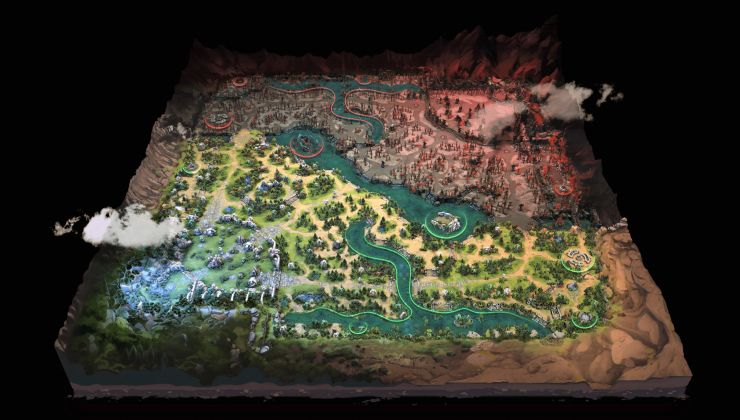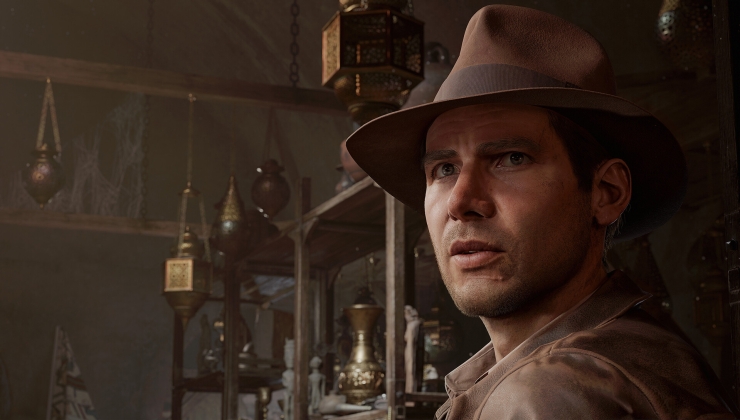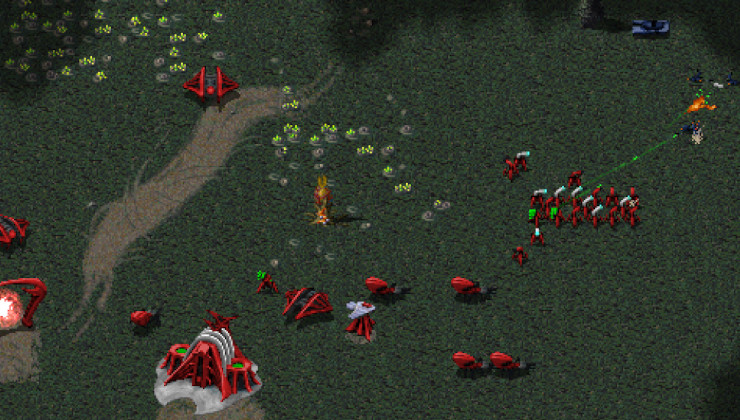Space is about to get bigger again, as Paradox has announced Stellaris: Distant Stars, a new story pack for the space grand strategy game.
I've said many times they needed more overall content and they've gradually delivered bit by bit. This has me quite excited, as the last big expansion was pretty damn fun to play around with.
Here's what Distant Stars will contain:
- Behind Closed Doors: Discover hidden traces of an ancient gateway network unlocking a sealed path to a constellation outside our own galaxy. But is this door holding something out, or keeping something in?
- Sensors are Picking up… That Can’t be Right: Encounter dozens of new anomalies and events for your intrepid scientists to observe and analyze, and a galaxy of wonders for them to discover.
- Brave New Worlds: Plot unexplored unique solar systems, each with their own story to tell. Gain technology, resources, and valuable worlds to colonize.
- There’s Always a Bigger Fish: Come face to face with a number of unique gargantuan creatures that exist and thrive in the vacuum of space. But approach with caution, because whether gentle giants or something more sinister, these legendary behemoths have existed long before you and will do what it takes to survive long after.
They announced it with a shiny trailer:

YouTube videos require cookies, you must accept their cookies to view. View cookie preferences.
Direct Link
Direct Link
For those interested in pre-orders, they're available on the Paradox Store. Stellaris itself is also on sale on the Paradox Store, great time to start learning it.
They're also about to show it off on their Twitch Channel.
Some you may have missed, popular articles from the last month:
All posts need to follow our rules. For users logged in: please hit the Report Flag icon on any post that breaks the rules or contains illegal / harmful content. Guest readers can email us for any issues.
I wish I could get excited about this. I loved this game after I bought it, for about a week. I really did.
Although I really, really wanted to play multiplayer. The cool thing about Stellaris is that in multiplayer, if the game host owns some DLC - everyone in the game gets to play with that particular DLC.
The sad thing about Stellaris is that there is barely anyone hosting public multiplayer games. You can literally wait for more than an hour for a game to just start, at times which are popular for gaming for any other game. I've managed to get into several multiplayer games with enough patience. However, I've never been able to finish a single one. Either one person will quit, a few hours into the game, and everyone else in the server follows... Or the game desyncs several hours into gameplay and the host never returns.
If you want play multiplayer in this game, you absolutely need to have friends who own it and want to play multiplayer. Unfortunately, I don't.
I may pick this DLC up after it has gone on sale several times and has been almost completely devalued... because the game itself became almost completely devalued (for me personally) when I discovered the impossibility of public multiplayer.
Last edited by Rhythagoras on 23 Apr 2018 at 3:38 pm UTC
Although I really, really wanted to play multiplayer. The cool thing about Stellaris is that in multiplayer, if the game host owns some DLC - everyone in the game gets to play with that particular DLC.
The sad thing about Stellaris is that there is barely anyone hosting public multiplayer games. You can literally wait for more than an hour for a game to just start, at times which are popular for gaming for any other game. I've managed to get into several multiplayer games with enough patience. However, I've never been able to finish a single one. Either one person will quit, a few hours into the game, and everyone else in the server follows... Or the game desyncs several hours into gameplay and the host never returns.
If you want play multiplayer in this game, you absolutely need to have friends who own it and want to play multiplayer. Unfortunately, I don't.
I may pick this DLC up after it has gone on sale several times and has been almost completely devalued... because the game itself became almost completely devalued (for me personally) when I discovered the impossibility of public multiplayer.
Last edited by Rhythagoras on 23 Apr 2018 at 3:38 pm UTC
0 Likes
It's funny how different features are important to different people. I can totally see that point of view, but for me I'm not really interested at all in multiplayer so that problem just doesn't hit me at all and I really like the game.
5 Likes, Who?
Maybe we can hook up, Rhyth. I only play multiplayer. We're the bad people making password protected games.
4 Likes, Who?
For me the final Stellaris release is 1.9. I pass on Stellaris 2 dlcs. A pity since the theme of thia pack is just right.
1 Likes, Who?
There have been many space strategies since Master of Orion, but none of them nailed it like Stellaris did. I'm having fun just exploring the space. It sometimes feels downright unreal how good this game is.
1 Likes, Who?
There’s Always a Bigger Fish: Come face to face with a number of unique gargantuan creatures that exist and thrive in the vacuum of space.Annnnd I'm sold. I picked up Leviathans pretty much entirely for the incredibly awesome Ether Drake. I love the concept of space-based lifeforms sailing through the void, looking on all our planet-based life as so many motes of dust. ^_^
0 Likes
These DLC releases are worth it for the music alone.
3 Likes, Who?
There’s Always a Bigger Fish: Come face to face with a number of unique gargantuan creatures that exist and thrive in the vacuum of space.Annnnd I'm sold. I picked up Leviathans pretty much entirely for the incredibly awesome Ether Drake. I love the concept of space-based lifeforms sailing through the void, looking on all our planet-based life as so many motes of dust. ^_^
You know what I could go for? Any time you encounter or start a fight with one of those Leviathan-class critters, a (skippable) cinematic cutscene showing their full glory, like.
0 Likes
These DLC releases are worth it for the music alone.Yup! The music in Stellaris is absolutely incredible, so satisfying.
0 Likes
I don't get the hate on Paradox's DLC policy. I mean, sure some of the DLCs are overpriced on release and i don't like that for some games they sell the new art separately, but do you know of many other developers that keep expanding their games continuously for several years? They have to pay for that somehow.
0 Likes
I don't get the hate on Paradox's DLC policy. I mean, sure some of the DLCs are overpriced on release and i don't like that for some games they sell the new art separately, but do you know of many other developers that keep expanding their games continuously for several years? They have to pay for that somehow.
Personally I don't blame the dlc policy by itself. Megagames like eu4 and ck2 wouldn't exist without it.
The problem is PdX addiction to dlc regular cash flows. Imho this has been especially detrimental to stellaris. Stuff is released unfinished and untested over and over again because release dates cannot be postponed or diluted over time. Even the controversial 2.0 release with all the feature scrapping and game style flattening ultimately had the purpose of simplify the game implementation so that it's easier to develop and test it (with... arguable success for now).
Imho PdX should milk Stellaris Project a little less for the time being and let it stabilize. If they continue to squeeze it like they're doing it will severely hurt the game.
0 Likes
Even the controversial 2.0 release with all the feature scrapping and game style flattening ultimately had the purpose of simplify the game implementation so that it's easier to develop and test it (with... arguable success for now).I don't really know whether I agree or not with the rest of what you say--I just have insufficient information to form a judgement--but I don't think this is really true. In some ways it makes the game more complex, like it tends to lead to more fleets running around. But mainly it seems like the key changes that simplify the game (mainly the shift to only hyperdrive movement) was aimed at impacting tactical gameplay. For the most part it was aimed at putting limits on the number of avenues invaders have to attack through, creating the possibility of chokepoints and making the idea of guarding borders at least plausible. This goes together with the new system of starbases which can be built up to seriously badass fighting power.
I'm not yet sure whether I think that's an improvement, but it does seem to have been a major motivation for the changes. They weren't all about simplifying the code.
0 Likes
Even the controversial 2.0 release with all the feature scrapping and game style flattening ultimately had the purpose of simplify the game implementation so that it's easier to develop and test it (with... arguable success for now).I don't really know whether I agree or not with the rest of what you say--I just have insufficient information to form a judgement--but I don't think this is really true. In some ways it makes the game more complex, like it tends to lead to more fleets running around. But mainly it seems like the key changes that simplify the game (mainly the shift to only hyperdrive movement) was aimed at impacting tactical gameplay. For the most part it was aimed at putting limits on the number of avenues invaders have to attack through, creating the possibility of chokepoints and making the idea of guarding borders at least plausible. This goes together with the new system of starbases which can be built up to seriously badass fighting power.
I'm not yet sure whether I think that's an improvement, but it does seem to have been a major motivation for the changes. They weren't all about simplifying the code.
My point was just on game implementation and testing not on game difficulty. Just with the mere FTL cut they removed a lot of code and a lot of edge cases from the game which ultimately makes it easier to develop (especially when they will enhance it in future) and test.
My opinion on 2.0 overall is that the game has been made more restrictive to the player. In the sense that either options have been removed entirely or new balance changes makes so that adopting a play style that diverges from the "meta" intended by the game designer is totally non viable compared to before. So yes: difficulty changed in the sense that several macro options have been removed. But the new play style enforced on the player does have a lot of new things to manage. So if 2.0 is more or less difficult is more of a subjective thing (how fast you can adapt to it and how much you are ok in doing that).
Last edited by Mal on 26 Apr 2018 at 12:53 pm UTC
0 Likes
Yesyes. I wasn't saying that the FTL cut didn't simplify the code (although some of the other changes didn't, eg changes to discourage doomstacks and hence encourage more fleets and add an extra bookkeeping feature to fleets, their size cap--it's minor, but that added complexity rather than subtracting). I was saying that their motivation for doing so was less to simplify the code and more to shift the tactical gameplay in ways they found desirable due to some perceived shortcomings of how it worked before. And again, I wasn't offering an opinion as to whether that tactical shift was actually desirable or not, just pointing out that Paradox definitely did seem to find it desirable and claimed that as their major motivation for the change. So if you say the change had the "ultimate purpose" of simplifying the code, I want to say that while that simplification happened and I'm sure they were pleased about that, it would be at least an overstatement to say that was the "ultimate purpose".Even the controversial 2.0 release with all the feature scrapping and game style flattening ultimately had the purpose of simplify the game implementation so that it's easier to develop and test it (with... arguable success for now).I don't really know whether I agree or not with the rest of what you say--I just have insufficient information to form a judgement--but I don't think this is really true. In some ways it makes the game more complex, like it tends to lead to more fleets running around. But mainly it seems like the key changes that simplify the game (mainly the shift to only hyperdrive movement) was aimed at impacting tactical gameplay. For the most part it was aimed at putting limits on the number of avenues invaders have to attack through, creating the possibility of chokepoints and making the idea of guarding borders at least plausible. This goes together with the new system of starbases which can be built up to seriously badass fighting power.
I'm not yet sure whether I think that's an improvement, but it does seem to have been a major motivation for the changes. They weren't all about simplifying the code.
My point was just on game implementation and testing not on game difficulty. Just with the mere FTL cut they removed a lot of code and a lot of edge cases from the game which ultimately makes it easier to develop (especially when they will enhance it in future) and test.
My opinion on 2.0 overall is that the game has been made more restrictive to the player. In the sense that either options have been removed entirely or new balance changes makes so that adopting a play style that diverges from the "meta" intended by the game designer is totally non viable compared to before. So yes: difficulty changed in the sense that several macro options have been removed. But the new play style enforced on the player does have a lot of new things to manage. So if 2.0 is more or less difficult is more of a subjective thing (how fast you can adapt to it and how much you are ok in doing that).
Last edited by Purple Library Guy on 26 Apr 2018 at 4:31 pm UTC
0 Likes
In the controversial dev diary #92 where asymmetrical FTL scrap have been announced the lead game designer justifies the choice with the fact that having all three together bogs all future development. Designing new expansions that work with all the base mechanics is difficult: they scrap some of them so they can expand more the game in the future. Outside that post I also remember him be very clear on twitch about this: it's either asymmetric FTL scrap or Stellaris stops at 1.9.
For a game with that many sold copies and such an enthusiast fan base the only motivation I can imagine for such drastic course of action is that either they are able to simplify the (game mechanics/code of the) base game enough so they can start to produce a satisfying amount of DLCs (and money) per year or the management will scrap the project because is not profitable enough.
Which is legit for a publicly quoted company. It's also legit for me as a customer in love with their game to hope that they slow down on DLCs schedule instead and take their time to release with less bugs (a constant issue of the game, they often apologize but the issue remain) and implement mechanics that in addition to be easily expandable (as they need) allow also for a more varied play styles (personal opinion ofc but I do find 2.0 to be less fun than 1.9 and without going into details the main reason in the end is just this: more restrictive game play).
For a game with that many sold copies and such an enthusiast fan base the only motivation I can imagine for such drastic course of action is that either they are able to simplify the (game mechanics/code of the) base game enough so they can start to produce a satisfying amount of DLCs (and money) per year or the management will scrap the project because is not profitable enough.
Which is legit for a publicly quoted company. It's also legit for me as a customer in love with their game to hope that they slow down on DLCs schedule instead and take their time to release with less bugs (a constant issue of the game, they often apologize but the issue remain) and implement mechanics that in addition to be easily expandable (as they need) allow also for a more varied play styles (personal opinion ofc but I do find 2.0 to be less fun than 1.9 and without going into details the main reason in the end is just this: more restrictive game play).
0 Likes










 How to set, change and reset your SteamOS / Steam Deck desktop sudo password
How to set, change and reset your SteamOS / Steam Deck desktop sudo password How to set up Decky Loader on Steam Deck / SteamOS for easy plugins
How to set up Decky Loader on Steam Deck / SteamOS for easy plugins
See more from me